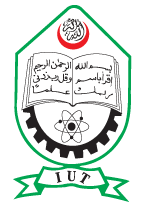Welcome to the Department of CSE
Home
News
Events
We are delighted to welcome you to the Department of Computer Science and Engineering (CSE) at the Islamic University of Technology (IUT). The Department’s long and decorated history is a story of relentless refinement and a never-ending pursuit of academic excellence at the highest level. The department was created with a vision to create a community of scholars and engineers who are equipped with the requisite knowledge and expertise to make meaningful contributions across the many different disciplines within Computer Science and Engineering.
The department has continued to reinvent itself throughout the years. Since its inception, the department has sought to develop a highly qualified pool of faculty members who are capable of guiding students through the many challenges and exciting opportunities inherent in such a fast-changing academic discipline. The department also strives to offer the state of the art in terms of facilities, laboratories, and resources to students with a view to creating more and more possibilities for research and effective learning. Furthermore, the department goes out of its way to arrange workshops, seminars, conferences, and internship programs, to assist in the holistic development of our students. We also seek to collaborate with the industry and other universities, pooling our expertise together to create meaningful and impactful work.
We aim to be a premier research hub, and for the attainment of this goal, we have outlined six different research areas with dedicated labs and associated resources. This includes The Systems and Software Lab (SSL), the Computer Vision Lab (CVLab), the Network and Data Analysis Group (NDAG), the Network Research Group, the Bioinformatics and Data Mining Research Group (BDMRG), and the Software Engineering Lab (SELab). These are active groups that enjoy vibrant participation from both us, the faculty at the CSE department, and also the students who get to explore a unique opportunity to experience research.
This is but a tiny glimpse of what the CSE department has to offer. We implore you to delve into our website and explore in detail the many activities and achievements and the dynamic culture of this department. Feel free to contact us for any further information. Your feedback is highly appreciated.
The department has continued to reinvent itself throughout the years. Since its inception, the department has sought to develop a highly qualified pool of faculty members who are capable of guiding students through the many challenges and exciting opportunities inherent in such a fast-changing academic discipline. The department also strives to offer the state of the art in terms of facilities, laboratories, and resources to students with a view to creating more and more possibilities for research and effective learning. Furthermore, the department goes out of its way to arrange workshops, seminars, conferences, and internship programs, to assist in the holistic development of our students. We also seek to collaborate with the industry and other universities, pooling our expertise together to create meaningful and impactful work.
We aim to be a premier research hub, and for the attainment of this goal, we have outlined six different research areas with dedicated labs and associated resources. This includes The Systems and Software Lab (SSL), the Computer Vision Lab (CVLab), the Network and Data Analysis Group (NDAG), the Network Research Group, the Bioinformatics and Data Mining Research Group (BDMRG), and the Software Engineering Lab (SELab). These are active groups that enjoy vibrant participation from both us, the faculty at the CSE department, and also the students who get to explore a unique opportunity to experience research.
This is but a tiny glimpse of what the CSE department has to offer. We implore you to delve into our website and explore in detail the many activities and achievements and the dynamic culture of this department. Feel free to contact us for any further information. Your feedback is highly appreciated.
Achievements






